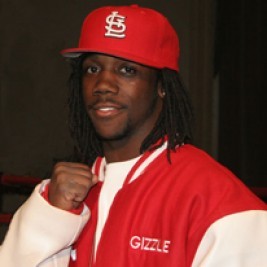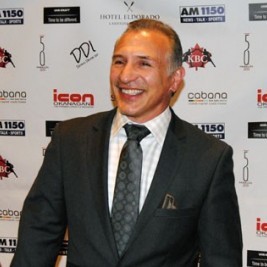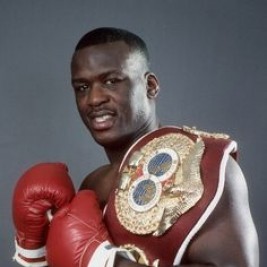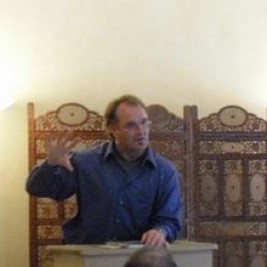
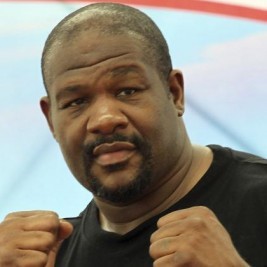
Corporate Appearances, Speaking Engagements, Autograph Signings, Endorsements, VIP Meet & Greets, Store Grand Openings
Book Riddick Bowe for a Speaking Engagement
Businesses, Non-profit organizations, event planners and companies across the country have worked closely with our booking agents to hire Riddick Bowe for a speaking engagements, guest appearances, product endorsements and corporate events. Many of those same clients have continued to turn to our speakers bureau as we can easily align Riddick Bowe’s availability with their upcoming seminar, gala, annual conference, corporate function, and grand opening. Our close relationship with Riddick Bowe’s booking agent and management team further enables us to provide inquiring clients with Riddick Bowe’s speaking fee and appearance cost.
If your goal is to hire Riddick Bowe to be your next keynote speaker or to be the next brand ambassador our celebrity speakers bureau can assist. If Riddick Bowe’s booking fee is outside your companies budget or your unable to align with his appearance availability, our booking agents can provide you a list of talent that aligns with your event theme, budget and event date.
Bowe was born and raised in the Brownsville section of Brooklyn, which at the time was one of New York's most infamous slums. The poverty was crushing, and life growing up was tough, and made no easier by the area's many gangs and prevalant violence. However, unlike fellow Brownsville product Mike Tyson, Bowe was known for a very genial and winning personality. This, along with his skill with handling the media, would help speed along his career.
Bowe's great size and strength made him very difficult to fight, and the fact that we was unusually quick for such a large man made him nearly unbeatable, especially in his early career. During the 80s and early 90s there were relatively few good heavyweights. That was part of why Tyson so thoroughly dominated the division. Bowe turned pro after the 1988 Seoul Olympics, and made a steady climb to the top while Tyson's career slid downhill after his stunning loss to Buster Douglas in 1990. After Tyson was sent to prison for rape, the division was open once again.
Bowe's talents caught the eyes of boxing fans and officials, and his light up a room smile and wit quickly gained him a large following. He was just 25 when he fought his first world title bout in 1992, against Evander Holyfield. Sadly, less than 4 years later, Bowe's career was over after manager Rock Newman made some questionable choices which led to a bizarre and debilitating bout with Andrew Golota. Bowe's trainer, the legendary Eddie Futch whose career spanned 8 decades, blamed Newman for the decisions he felt cut short the career of one of history's most talented heavyweights. Nevertheless, Newman had guided Bowe early on to the heavyweight title, grooming the champion for his title shot. The manager and his protege, close for many years, were later involved in an acrimonious lawsuit over the distribution of purses, but Bowe ultimately dropped his claim against Newman.
The bout was a classic, with Bowe at his finest, and Holyfield fighting him every minute. Before the fight Holyfield had been deeply stung by boxing writers saying that he was too small to be a true heavyweight or to dominate the division, and seemed to come into the bout looking to prove those claims wrong. He did this by coming straight at Bowe. The result was a back and forth slugfest culminating in the 10th round, which is considered one of the greatest in boxing history. Early in the round Bowe hurt Holyfield badly with a huge uppercut, after which Holyfield staggered across the ring and nearly went down. Bowe tried to capitalize, but Holyfield defended himself well as he slowly regained his strength. After Bowe had grown tired from throwing so many punches, Holyfield came back and hit Bowe with a series of hard, fast, ripping punches, and it looked like Hoylfield might have regained control of the fight. However, Holyfield might have used up his last strength with that rally, because Bowe knocked him down early in the next round, and Holyfield was unable to quite come back again. Bowe won by unanimous decision, and was now the Undisputed Champion.
Bowe's first reign as Champion would be short and somewhat disappointing. He defended his title twice before meeting Holyfield again. Both challengers were considered easy opponnents. First came Michael Dokes, an ex-champion from the early 80s who had only become champ because of the lack of good fighters, and journeyman Jesse Ferguson. In addition to this, Bowe famously threw one of his championship belts into a trash can at a press conferance rather than fight Lennox Lewis, the equally huge and skilled heavyweight who had defeated Bowe in the Olympics. At this time Bowe would begin a number of bad habits that would take away from his career, most prominent of which was overeating. He would balloon greatly between bouts, then go on crash diets in order to get into fighting shape. Or, just not bothering getting into proper fighting shape at all.
He came into his second fight with Holyfield at 246 pounds, more than 10 pounds above his weight in their first fight. Bowe's skills helped carry him through the first half of the bout, but then came the bizarre fan man incident in which a man in a parachute with a large fan on his back crashed into the ringside crowd, including Bowe's wife. The fight was paused for nearly half an hour while the "Fan Man" was cleared away and several people, including Bowe's wife, were taken to the hospital. During that time Holyfield regained his strength and Bowe lost his concentration, his mind clearly elsewhere. Holyfield won a narrow and debated decision. To this day, it remains Bowe's only loss.
After the loss, Bowe's bad habits worsened. His weight between fights would get over 300 pounds, more than sixty or seventy pounds more than his prime fighting weight. He became even more lax in training, and his skills began to fade. Also, his legendary trainer, Eddie Futch, started becoming ever more frustrated with Bowe and began to worry about the future of Bowe's once promising career.
Bowe's behavior in the ring started to become irregular too. One bout was ruled a no contest because he hit an opponnent while the man was already down. He punched Larry Donald during a press conferance for their fight, one of the first of the press conferance brawls that have become prevalent in boxing. Bowe won the WBO titile, a belt not recognized on par with the other world titles, but continued to show little eagerness to work at being a champion. He got into a number of brawls at press conferances with one of his challengers for that title, Jorge Luis Gonzalez, until both men began to give talks in future conferences from behind bulletproof glasses enclosures. Bowe fought a third fight with Holyfield, and despite the fact that Holyfield was badly ailing with Hepatitis A, he managed to knock Bowe down before running out of gas. Bowe emerged victorious with a stunning 8th round knockout. But then came two events - one outside the ring and one inside it -- which would change Riddick Bowe's career, and perhaps his life, forever.
After the Holyfield victory in 1995, Riddick Bowe's manager Rock Newman filed a lawsuit against HBO, who had the exclusive television contract with Riddick Bowe. While the suit was pending, Bowe was not in training camp, and he sat idle for many months. This business dispute could have cost him his career, as the long layoff left the former champion far from top form. Most boxing insiders knew Bowe was a fighter who had to be kept in camp, and kept busy, in order to stay focused and stay in shape.
Aside from the lawsuit outside the ring, Newman's agreement for his fighter to fight Golota was also problematic. Golota was a little-respected fighter with a reputation for being wild, and had frequently resorted to fouls and dirty tactics. He had bitten one fighter while in trouble, hit people after the bell, used his forearms to smash fighters, and intentionally headbutted a fighter while ahead in that fight. If Bowe beat Golota, everyone would say he should have been able to beat him. If Bowe lost to Golota, then he lost to a "nobody" and it would do nothing for Bowe's status in the division. Few, if any, gave Golota a chance.
Bowe came into the ring visibly flabby, this time at 252 pounds. Trainer Eddie Futch was worried and he should have known. He had trained nearly two dozen world champions, and 5 heavyweight champions including Joe Frazier and Ken Norton. Futch had cautioned Rock Newman and Riddick Bowe about the risks of the fight in this condition, and urged them to postpone it. They disagreed, and went ahead with the bout on July 6, 1996, at Madison Square Garden. It turned out to be one of the biggest management errors in boxing history.
Bowe looked sluggish at the start of the fight, while Golota looked sharp, dominating the first round with his jab and tactical skill. In his early career, Bowe's jab had been a deadly weapon. Now it was easily overpowered and rendered useless by Golota. Perhaps realizing that he was not up to fighting a tactical fight, Bowe came out looking to brawl in the second round. At first he seemed to have the edge, but by the end of the second round Golota had come back and hit Bowe with some hard shots, snapping Riddick's head around several times and wobbling him more than once. Through the third round Golota began to take control, and he started plain out pounding Bowe in the fourth. Suddenly the question seemed not whether Bowe would win, but whether he would survive the hurt that Golota was putting on him. With about 30 seconds left in the fourth round, however, Golota hit Bowe with a hard low blow well below the belt, and first got penalized for his low punches.
The fourth round set a pattern for the rest of the fight. Golota poured on the punishment, but continued flirting with disaster because of low blows. He was penalized a second time, and finally in the seventh round, he threw a series of three punches, all low, and was disqualified for it.
Bowe had to be carried out of the ring and back to the dressing room, and in the ring one of boxings worst riots happened. Angered by the low blows which injured former champion Bowe, and frustrated by Golota's dirty tactics, a member of Bowe's camp hit Golota with a walkie-talkie. This ignited a melee in the ring and in the seats,including many fans. Lou Duva, Golota's trainer, collapsed and at the time it was feared that he might have had a heart attack.
A rematch was held in just five months. Even those closest to Bowe had their faith shaken. His mother refused to watch the rematch because of the horror she felt after the first bout, and Eddie Futch tried to talk Bowe into retiring. When Bowe refused, Futch resigned as his trainer.
For the second bout, Bowe perhaps overcompensated on the weight issue, going on an extreme crash diet that seemed to sap his strength as a result of losing too much weight too quickly. He looked drained and weak, and his legs seemed rubbery and unable to support him.
The second match was a virtual replay of the first, except that the domination by Golota was more one-sided, and also more brutal. Bowe was knocked down twice, and although he managed to come back after the first knockdown to knock Golota down, that was the only time in the fight when he managed to take the offense. The rest of the fight was spent with Golota pounding Bowe, especially from the fifth through the ninth rounds, where Golota would knock a staggering and wobbly Bowe from one side of the ring to the other. Finally at the very end of the ninth round Golota was disqualified again, once again for low blows. This time, however, Golota had been more versatile with his fouls, as he also intentionally headbutted Bowe, backhanded him, hit him with illegal blows behind the head, etc. When speaking after the fight Bowe's speech seemed to be slurred, and rumors began that the fights with Holyfield and Golota had caused him brain damage. Bowe retired after the second Golota fight.
Bowe's life after his retirement was filled with a number of odd events. He briefly enlisted in the US Marines, which he described as having been an old dream. Bowe's lax habits did not mix well with the Marine Corp's trademark discipline, however, and he resigned from basic training after barely a week.
In 1999, he kidnapped his separated wife Judy and their children, perhaps trying to get her to get back together. He let them go without incident after an interstate chase. (Bowe had gathered them all into his car). He was eventually convincted of kidnapping, and served 18 months in prison for it. After being released, he announced his intention to make a comeback.
He declared bankruptcy in 2005.

Let our team of booking agents help create a memorable experience with hiring Riddick Bowe for your store grand opening, golf outing, trade show booth or corporate outing.
NOPACTalent acts as a Celebrity Speakers Bureau and Athlete Booking agency for corporate functions, appearances, private events and speaking engagements. NOPACTalent does not claim or represent itself as Riddick Bowe’s speakers bureau, agent, manager or management company for Riddick Bowe or any celebrity on this website. NOPACTalent represents organizations seeking to hire motivational speakers, athletes, celebrities and entertainers for private corporate events, celebrity endorsements, personal appearances, and speaking engagements.



